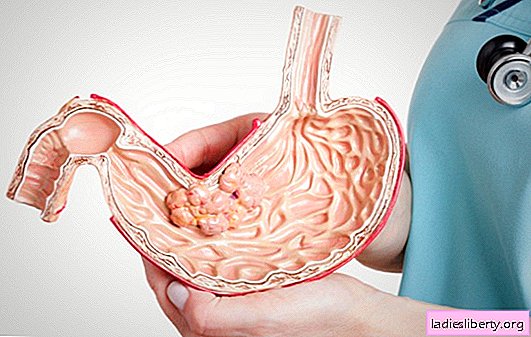
In the modern world, a truly enormous scale has taken on the incidence of pathologies of the gastrointestinal tract (GIT).
If you believe the statistics, according to various estimates, every third inhabitant of the Earth has problems with the gastrointestinal tract and, first of all, with the stomach. The incidence of gastric pathologies alone is from 40 to 80%. Horrific figure.
The real "leader" among the pathologies of the gastrointestinal tract is gastritis. Slightly less often - ulcerative lesions of the stomach.
Any gastrointestinal disease is manifested by characteristic symptoms. One of the most striking manifestations is pain in the epigastric region (when the stomach is sore). This is a nonspecific symptom and can occur in various diseases, even those not related to the stomach. There are more questions than answers. It should be understood in more detail.
Stomach hurts: causes
Pain in the stomach - a non-specific symptom. As already mentioned, it can occur both in diseases of the organ itself and for other reasons. The reasons that the stomach hurts a lot. It could be about:
• Gastritis. The most likely cause of pain in the epigastric region. It occurs in a third of the adult population, but children are not completely safe. Gastritis has a negative developmental tendency and, without proper treatment, results in gastric ulcer or oncological organ damage.
• stomach ulcer. It is an ulceration and thinning of the gastric mucosa. It is considered a dangerous condition requiring medical attention. It can get complicated over time: this is known as a perforated ulcer.
• Benign and malignant lesions of the stomach. This includes polyps (benign), stomach cancer.
• Lesions of an infectious viral origin. The causative agents of the disease can be E. coli, etc.
• Poisoning. Poisoning is almost always accompanied by pain in the epigastric region. The reason for this condition lies in the irritation of the gastric mucosa by the vital products of bacteria and viral agents.
• Allergic and other immune reactions. More common in children. They have a common name: "diathesis".
There are other reasons that have nothing to do with the stomach. Pain can be given to the epigastric region from:
• Reactive pancreatitis (inflammation of the pancreas).
• Inflammation of the small intestine and colon (colitis).
• Appendicitis.
• Hearts (with coronary heart disease, heart attack, etc.).
High Risk Factors: Who Has Most Stomach Ache Most Often
Paradoxically, in certain population groups, stomach pain is more common. They are at high risk. Among them:
• Persons without a normal and clear diet. Most of these people. However, it is regular nutrition that is the key to the health of the gastrointestinal tract.
• People who abuse fast snacks. Nutrition should be not only regular, but also healthy. Fast food is not conducive to health.
• Persons engaged in hard work.
• Persons who have recently experienced an infectious disease.
The reasons that the stomach hurts greatly, as well as the risk factors, are diverse.
Concomitant symptoms of severe stomach pain
Pain in the epigastric region is a striking symptom, but it does not give a clear answer, what is the "root of evil." Of great importance in the differential diagnosis are associated symptoms. They allow the doctor to understand which way to move and how to examine the patient. According to the described symptoms, you can suspect a disease in yourself, but you should not do self-diagnosis. So, what kind of symptoms are accompanied by certain diseases:
With gastritis There are a lot of manifestations. In addition to intense aching, pulling or acute pain, the following are manifested:
- Heartburn. It is caused by the increased acidity of the gastric juice and its emissions into the esophagus. It is slightly less common in gastritis with low acidity.
- Feeling of fullness in the epigastric region. Patients describe this condition as follows: "as if a stone were swallowed."
- Nausea.
- Belching with the smell of chicken eggs.
- The pain syndrome with gastritis is almost constant and intensifies after eating.
- With gastric ulcer, the symptoms are similar. However, the stomach hurts more. In addition, the pain subsides after the next meal. This allows you to roughly determine what the source of the problem is.
- Colitis (inflammation of the intestines). Often cause a reaction from the stomach. The characteristic symptoms of colitis are:
- Diarrhea
- Constipation (may alternate with diarrhea).
- Spilled abdominal pain (including wandering).
Poisoning is rarely accompanied by an isolated lesion of the stomach. Where more often the patient experiences a whole gamut of symptoms, both from the stomach and from the intestine. The clinical picture is characterized by both symptoms of gastritis and manifestations of colitis.
Only a doctor can distinguish stomach diseases from heart attack, pancreatitis and other diseases. At the first suspicion, it is recommended to go to the doctor or call an ambulance.
Diagnosis of severe pain in the stomach
Diagnostics should begin with the selection of a specialist.
Gastrointestinal problems gastroenterologists.
At the initial consultation, the doctor asks questions regarding the patient's condition, his complaints. After that, the diagnosis itself begins. And it begins with a physical examination - palpation of the abdomen. It allows you to evaluate the size and structure of organs, to identify pain reactions.
An important role is played by instrumental research:
• Contrast radiography of the stomach. It is used to identify neoplasms of the body, assess its condition.
• Ultrasound. Ultrasound examination makes it possible to visually assess the condition of the abdominal organs.
• Endoscopic examination (FGDS). It is the most informative instrumental study, because it allows you to evaluate with your own eyes the state of the gastric mucosa. If necessary, you can take tissue samples for a biopsy.
• Scintigraphy.
In laboratory tests, signs of inflammation are usually detected: leukocytosis, elevated ESR.
What to do if your stomach hurts: first aid and treatment
What should I do if my stomach hurts? The answer lies on the surface: see a doctor immediately.
To alleviate your own condition, you can take an antacid (only and only with gastritis with high acidity), an antispasmodic (No-shpa, etc.). It is impossible to be treated with these drugs for a long time without control by a doctor. There is a high risk of translating the disease into a chronic form.
In general, conservative methods are sufficient to treat severe stomach pain. Surgery is resorted to in exceptional cases, for example, with a perforated ulcer.
Medicines are prescribed as follows:
• Antacids. To reduce the acidity of gastric juice.
• Analgesics. To relieve pain.
• Antispasmodics. Relieve smooth muscle of the stomach, relieving pain.
• Drugs that prevent excessive secretion of acid (Omeprazole, etc.).
A few words about folk methods for treating stomach pain
Many patients find a different answer to the question, "what to do when the stomach hurts?" This answer lies in folk, "grandmother" methods. However, you need to take into account the fact that many of the recipes common on the Internet are frankly dangerous.
Only the most egregious should be listed:
• Tinctures on alcohol. In any form, are strictly contraindicated. Cause acid imbalance. They can only make it worse.
• Honey. Contraindicated in gastritis.
• Propolis. It should be used with great care, due to frequent allergic reactions.
• Lemon. Like honey, it causes an increase in the acidity of gastric juice.
During an exacerbation of gastritis, as well as other diseases, it is generally recommended to soften the diet as much as possible.
Prevention of pain in the stomach
• The main recommendation that promotes prevention is to optimize your diet and take for a habit at about the same time.
• Timely treat all sources of chronic inflammation.
• At the first suspicion of a pathology of the stomach or other organs, go to the doctor immediately.
Severe pain in the epigastric region is far from always (though most often) characterizing diseases of the stomach.
It is impossible to independently understand the array of diseases, for this there are doctors. The main recommendation is to go to the hospital for any discomfort.
For its temporary relief, you can take some drugs, but they should not be abused. Is it dangerous.











